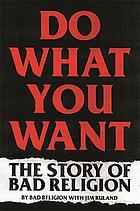
Do What You Want
The Story of Bad Religion
کتاب های مرتبط
- اطلاعات
- نقد و بررسی
- دیدگاه کاربران
نقد و بررسی

March 9, 2020
Ruland (My Damage) serves up a heady, revelatory collaboration with the enduring punk band Bad Religion, set to be published on the 40th anniversary of the group’s formation. Ruland begins with the band’s humble origins as a group of teens in the uncool San Fernando Valley and captures how their intelligent lyrics meant to “encourage the audience to not just think, but think critically” helped them stand out in the punk scene. Ruland anchors the group portrait with interviews with three of the founding members: Greg Graffin, vocalist, known as the “punk professor” for his parallel career as an evolutionary biologist; Brett Gurewitz, guitarist and founder of Epitaph Records, which released the band’s records; and Jay Bentley, bassist, responsible for writing each show’s set list. (Unlike most successful touring bands, Ruland explains, Bad Religion would rather challenge themselves and surprise their fans by playing a different set every night.) Readers will appreciate Ruland’s thorough reporting and insight on the various lineup changes over the years, along with his convincing analysis of punk history in which, counter to the consensus of popular rock critics, Ruland argues that bands such as Green Day and Rancid were influenced by the Southern California punk scene, not by Nirvana or Seattle’s grunge music. This testament to the value of hard work and independent thinking offers a thrilling alternative to the conventional rise-and-fall rock narrative.

May 1, 2020
From humble beginnings as a garage band of Southern California teenagers, Bad Religion has ridden a wave of thoughtful and well-crafted songwriting and performances that has lasted for four decades with no end in sight. Then-15-year-old singer Greg Graffin's first recorded words into a microphone may have been "this isn't art, this is suicide," but career-wise he was sorely mistaken. Seventeen albums later, the band continues to tour the world and release energetic, in-your-face punk that both thrills and questions its dedicated audience. Bad Religion produced this insider story with Ruland (coauthor, with Black Flag's Keith Morris, My Damage), who keeps things going at a pace that almost matches that of the performers. There aren't many groups that can say they've been true to their muse for four decades, and there were hurdles to overcome, but in the words of cofounder Brett Gurewitz, the band "just won't die." Their story is here. VERDICT An engaging chronicle of a band that has, remarkably, retained its founding spirit and relevancy many years on. A delightful read for fans of both the early days of punk and those curious about contemporary practice.--Bill Baars, formerly with Lake Oswego P.L., OR
Copyright 2020 Library Journal, LLC Used with permission.

June 1, 2020
An authorized band biography that attempts to provide long-overdue credit. After persevering through four decades, an eternity by punk-rock standards, Bad Religion has "never been more popular than they are right now." Devoted fans of the internationally popular band will embrace the narrative, which offers plenty of backstory on the splits and reunions of the two principal songwriters, Greg Graffin and Brett Gurewitz. It's both a chronicle and critical guide to each of the band's many albums and tours (nonfans will be overwhelmed by some of the detail). The biography--written with the assistance of Ruland, who co-authored the memoir of Black Flag and Circle Jerks founding member Keith Morris--also suggests why Bad Religion never achieved the sales levels or popularity of Nirvana or Green Day, whose influence on musical culture Graffin and company feel has been overstated, at least in comparison to their own. " 'People are finally filling in the chapter between 1983 and 1991, ' Greg said. 'What happened? Two words: Bad Religion.' " From the beginning, the band has felt slighted, starting young as suburban teenagers from the San Fernando Valley, rising with the spread of punk culture, and then getting overshadowed by bands who sold more but perhaps didn't have Bad Religion's European reach or die-hard following. It's an often fascinating story, especially regarding Graffin's pursuit of his doctorate in evolutionary biology and Gurewitz's progression to record mogul through his founding of Epitaph Records. There are also the expected stories of excess and addition, and the claim that "Greg and Brett were establishing themselves as the Beatles of punk rock" would be more credible if it didn't come from the band itself. The text generally refers to the characters by first name only, an insider's perspective that prevents much critical distancing. The band has overcome a lot of challenges over the years, and this sufficient narrative documents every one of them.
COPYRIGHT(2020) Kirkus Reviews, ALL RIGHTS RESERVED.

























دیدگاه کاربران